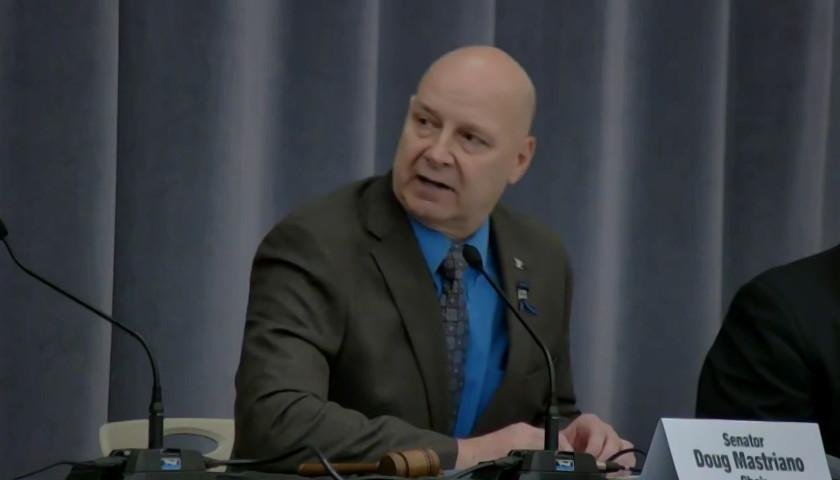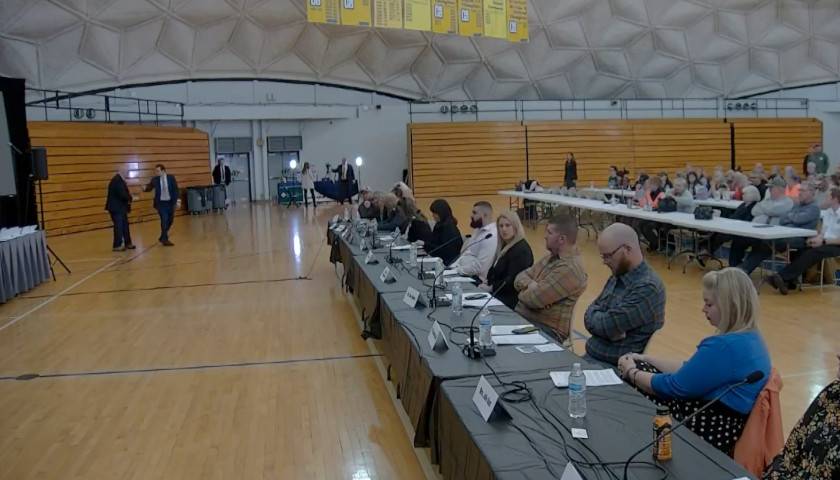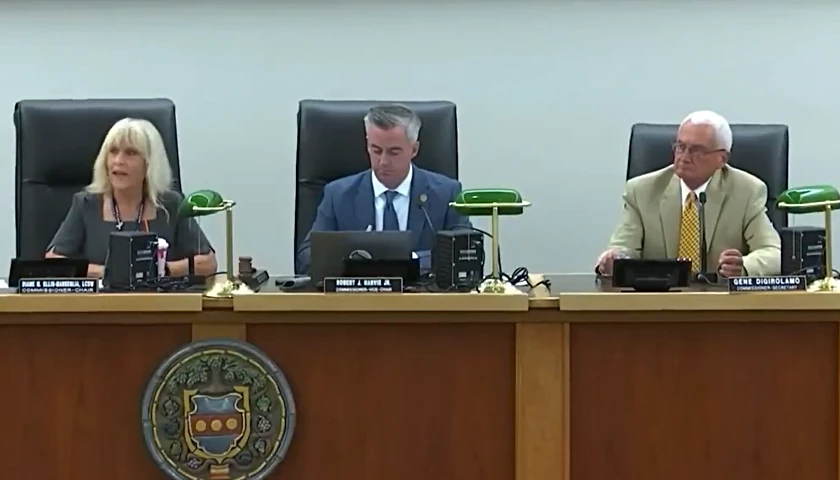Western Pennsylvanians who live near the site of the February 3 Norfolk Southern train derailment and subsequent burn went before a State Senate Committee Thursday to state that the event is causing deleterious health consequences.
The 53-car train derailed in the village of East Palestine, Ohio, less than a mile from where the Buckeye State abuts Beaver County in Pennsylvania. In the crash’s aftermath, the train company proceeded to burn five rail cars containing vinyl chloride, a course of action company officials said would avert a potentially disastrous explosion. Pennsylvania Governor Josh Shapiro (D) initially supported what has been called the “controlled burn” but has subsequently blasted Norfolk Southern for its handling of the incident, particularly its decision to burn five cars; Shapiro asserted he was only told one car would be incinerated.
Shapiro’s own conduct during the event has drawn scrutiny from his erstwhile opponent for the governor’s seat, Doug Mastriano, a Republican Gettysburg-area state senator who led Thursday’s hearing. As chair of the Senate Veterans Affairs and Emergency Preparedness Committee, the senator hosted the event at the Community College of Beaver County in Monaca.
 Recently, Mastriano has called into question Shapiro’s decision not to declare a state of emergency. He also has questioned official assurances that testing of local air, land, and water indicates no increase in toxicity since the burn and release. The senator and others have observed strange coloration in rivers that run through Beaver County; residents attesting to developing rashes, headaches, and other health problems; and farmers reporting dead livestock.
Recently, Mastriano has called into question Shapiro’s decision not to declare a state of emergency. He also has questioned official assurances that testing of local air, land, and water indicates no increase in toxicity since the burn and release. The senator and others have observed strange coloration in rivers that run through Beaver County; residents attesting to developing rashes, headaches, and other health problems; and farmers reporting dead livestock.
“This is no game,” Mastriano told hearing attendees. “Your lives, your livelihoods, your pets, your animals, your kids — we want to protect them. And pat answers from some bureaucrat far away aren’t going to work for us.”
Mastriano’s Senate colleagues who were present echoed his calls for recompense for those harmed by the response to the derailment.
“We need to do whatever it [takes] to make you whole,” State Senator Katie Muth (D-Royersford) said. “And I don’t know those answers now because I don’t know what was all on that train and no one really wants to say what was in all the other cars that didn’t derail; there’s contents missing from the cars that did derail…. You have every right to be concerned and scared.”
Muth said residents of areas near the site may ultimately need to move and have the rail company pay for their relocations.
The committee invited Norfolk Southern Corp. chief executive officer Alan Shaw to testify, but he declined to attend. Mastriano, however, anticipates that the panel will end up subpoenaing Shaw to answer questions in the near future.
Sheila Stiegler of Slippery Rock Township in Lawrence County, 16 miles from the derailment site, was among those giving accounts of her experiences after the vent and burn proceeded. She said she has noticed an unfamiliar odor in the air above her property where she grows her own produce, raises livestock, and cares for her grandchildren. A few days into the incident, she said, she and her husband developed sinus congestion and sore throats.
According to Steigler, no support from the state to protect the life on her property was forthcoming.
“I was shocked to find our governor was not on location or addressing the impact on Pennsylvania,” she said. “Communities of Pennsylvania residents were fearful. We were faced with uncertainty; we felt abandoned and on our own.”
Steigler faulted Shapiro for attending the Grammy awards and making other public trips instead of intently addressing the situation in Butler and Lawrence counties.
Lonnie Miller, a native of Pennsylvania who now lives in East Palestine but who still has family in the Keystone State, said she was rattled by the explosions of pink and orange flames from the derailed train and the rancid fumes she and neighbors said they had to inhale as they had nowhere to go after the incident.
“It was a scene from a disaster movie that you do not want to live in,” she said.
Randy Padfield, director of the Pennsylvania Emergency Management Agency, gave testimony reiterating Shapiro’s assertion that Norfolk Southern failed to express that it planned to vent and burn five rail cars rather than one and said the company neglected to consider other options.
Richard Negrin, acting secretary of the Pennsylvania Department of Environmental Protection, assured area residents his agency is monitoring area water and air independent of the federal testing being done. He said soil testing will also proceed soon. Nonetheless, he stated, it will take time for testing to confirm contamination.
“We don’t believe that there’s a significant risk to our groundwater,” he said. “But that doesn’t matter: We’re still testing right now to get a baseline. And if groundwater is in fact contaminated, it’s going to take three to six months, the experts tell me. So we’re going to continue and we’re committed to testing long-term….”
The committee finally heard from attorneys seeking redress for alleged harms resulting from the derailment response. Rene Rocha, an attorney with the firm Morgan & Morgan, who represents area residents in a class-action lawsuit against Norfolk Southern, said the corporation was negligent in a number of respects throughout the incident.
“There’s no reason why that train ever should have derailed in the first place,” Rocha said. He further opined that, once the train went off the tracks, its cars containing vinyl chloride should not have been incinerated as they were.
Rocha noted rail companies have manuals explaining how to handle derailments of trains carrying toxic substances and “there’s no way [those manuals] said ‘Drain all the cars and light them on fire in a ditch.’”
Despite testing supposedly indicating no heightened toxicity, he said, “I can tell you, as the residents know, that that’s not the case…. There was substantial exposure.”
Rocha said Norfolk Southern has extended an offer to pay $1,000 to affected residents. The attorney advised “extreme caution” to anyone thinking about accepting that offer as it could deprive them of the ability to seek further damages. “It’s just not worth $1,000.”
– – –
Bradley Vasoli is managing editor of The Pennsylvania Daily Star. Follow Brad on Twitter at @BVasoli. Email tips to [email protected].




